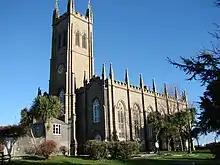St Mary's Church, Penzance
St Mary's Church, Penzance is a Grade II* listed parish church in the Church of England in Penzance, Cornwall.[1]
| St Mary’s Church, Penzance | |
|---|---|
 St Mary’s Church, Penzance | |
| 50°06′59.82″N 5°32′0.33″W | |
| Location | Penzance |
| Country | England |
| Denomination | Church of England |
| Churchmanship | Broad Church |
| History | |
| Dedication | St Mary |
| Consecrated | 6 September 1836 |
| Architecture | |
| Heritage designation | Grade II* listed[1] |
| Architect(s) | Charles Hutchens |
| Groundbreaking | 1832 |
| Completed | 15 November 1835 |
| Administration | |
| Province | Province of Canterbury |
| Diocese | Diocese of Truro |
| Archdeaconry | Cornwall |
| Deanery | Penwith |
| Parish | Penzance |
History
The site as a place of worship dates from at least the fourteenth century, but was a chapel to the parish of Madron and first licensed in 1321. The chapel was spared during the Spanish raid in August 1595 because Mass had been celebrated, previously.[2] Despite enlargements in 1662 to 1672, and 1782 it was severely overcrowded by 1824. At that time it served a population of circa 7000 and was still a chapel of ease to Madron, two miles inland.[2]
The Reverend Thomas Vyvyan made arrangements to replace it with a new church designed by Charles Hutchens.[3] The Clerk of Works was John Pope Vibert. £16,000 was raised, mainly from the church's own communion for the new building. A further £800 was raised for the organ, £800 for the bells and £300 for the carillon.[4] The rebuilt church was consecrated by the Bishop of Exeter, Henry Phillpotts, on 6 September 1836.[5] A separate parish of Penzance was created in 1871.[1][3] The churchyard was extended on the southern side in 1883.[6]
A gift of seventeen aloes by Mr Dorrien-Smith of Tresco, Isles of Scilly were planted in the churchyard in 1886.[7]
Arson destroyed the interior of the church in April 1985 and two further arson attempts occurred in November 2018.[1][3][8]
Bells
One of the bells from the previous church was installed in the temporary belfry of St John's Church in 1885. It cost £12 18s 9d when first installed in the steeple of St Mary's in 1667.[9]
The first bell in the present church was inscribed ″PEACE AND GOOD NEIGHBOURHOOD, 1713 JP″ and was moved to St John's Hall in 1865 for use as a fire-bell. Eight new bells were installed that year at a cost of £950. Their size (diameter at mouth), weight and inscriptions are,
- 30 inches (760 mm); 6cwt 3qrs 4lbs; ″PEACE AND GOOD NEIGHBOURHOOD A.D. 1865; TAYLOR AND CO., FOUNDERS″,
- 30 inches (760 mm); 7cwt 0qrs 10lbs; ″TAYLOR AND CO., FOUNDERS, LOUGHBOROUGH A.D. 1835″,
- 34 inches (860 mm); 8cwt 0qrs 10lbs; ″THE GIFT OF PHILIP HEDGELAND M.A., JAMES ALDRINGE DEVENISH, ASSISTANT CURATE, WALTER EDMUNDS, JUN., CHAPELWARDEN, SAMUEL YORK, SIDESMAN A.D. 1865, TAYLOR AND CO., FOUNDERS, LOUGHBOROUGH″,
- 30 inches (760 mm); 8cwt 2qrs 10lbs; ″TAYLOR AND CO., FOUNDERS, LOUGHBOROUGH A.D., 1865″,
- 38.5 inches (980 mm); 10cwt 1qrs 22lbs; ″THE GIFT OF CAROLINE AND ELIZABETH CATHERINE THOMAS CARNE A.D.1865″,
- 40 inches (1,000 mm); 11cwt 1qrs 3lbs; ″TAYLOR AND CO., A.D. 1865″,
- 44 inches (1,100 mm); 14cwt 2qrs 17lbs; ″THE GIFT OF THE CORPORATION. FRANCIS BOASE, MAYOR, A.D., 1865, J. TAYLOR AND CO., FOUNDERS, LOUGHBOROUGH, LATE OF OXFORD AND BUCKLAND BREWER, DEVON".
- 50 inches (1,300 mm); 20cwt 2qrs 6lbs; ″BOLITHO 1865. J TAYLOR AND CO., FOUNDERS, LOUGHBOROUGH, LEICESTERSHIRE″.[10]
A carillon, costing about £300 and paid for by public subscription, was installed as a memorial to the town clerk and ornithologist, Edward Hearle Rodd. The first to be erected in Cornwall, it was completed by Gillett, Bland & Co on 10 November 1880 and first played at 8.00 pm on Sunday, 28 November 1880. The carillon played fourteen tunes and a tune was played for two weeks, every four hours at 8 am, noon, 4 and 8 pm, midnight and 4 am. The carillon had two barrels and two hammers for each of the bells. The hammers did not interfere with the normal ringing of the eight bells by bell-ringers.[10][11]
|
|
Organ
The organ contains casework dating from 1676 originally located in St Mary's Church, Oxford. The organ is by J. W. Walker & Sons Ltd and was moved here from Oxford in 1949. A specification of the organ can be found on the National Pipe Organ Register.[12]
References
- Historic England. "Church of St Mary, Chapel Street (Grade II*) (1220507)". National Heritage List for England. Retrieved 4 February 2017.
- Historic England. "Monument No 1572493 (1572493)". Research records (formerly PastScape). Retrieved 4 February 2017.
- Michael Sagar-Fenton (2017). Penzance in 50 Buildings. Amberley Publishing. p. 33. ISBN 9781445665863.
- "While this is what Conservatives, ...". The Cornishman. No. 384. 26 November 1885. p. 4.
- "The Lord Bishop of Exeter". Exeter and Plymouth Gazette. Plymouth. 10 September 1836. Retrieved 27 September 2015 – via British Newspaper Archive.
- "Penzance". The Cornishman. No. 246. 29 March 1883. p. 4.
- "Aloes For St. Mary's Burial-Ground". The Cornishman. No. 408. 13 May 1886. p. 7.
- Becquart, Charlotte (29 November 2018). "Arson probe starts after fire at church". The Cornishman. pp. 1 & 6.
- "Penzance". The Cornishman. No. 367. 17 December 1885. p. 4.
- "The Rodd Carillon". The Cornishman. No. 123. 18 November 1880. p. 4.
- "St Mary's Church Carillon". The Cornishman. No. 125. 2 December 1880. p. 4.
- "NPOR [D08564]". National Pipe Organ Register. British Institute of Organ Studies. Retrieved 27 September 2015.